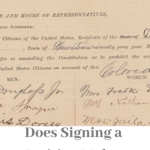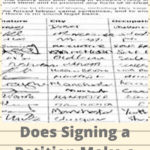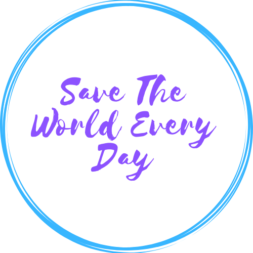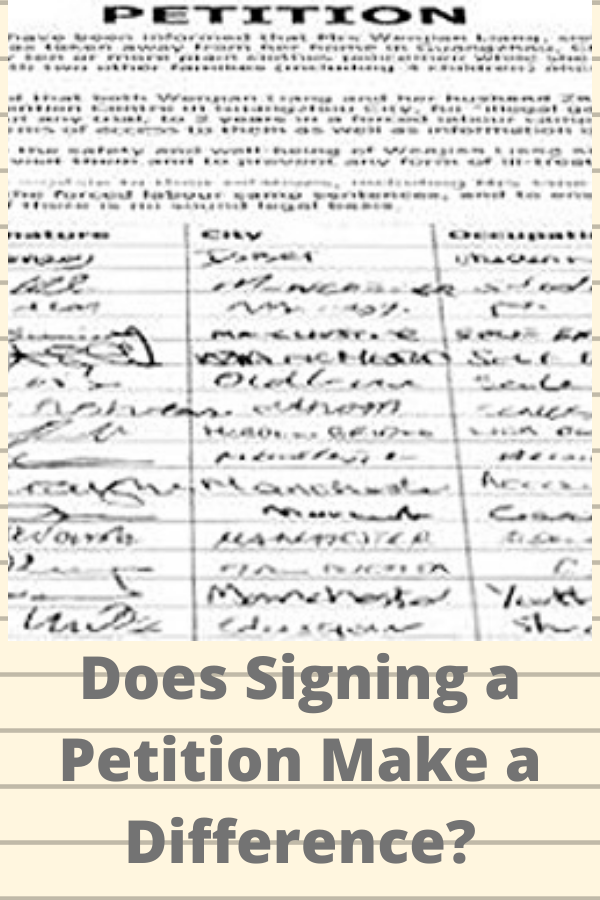Does Signing Petitions Make a Difference?
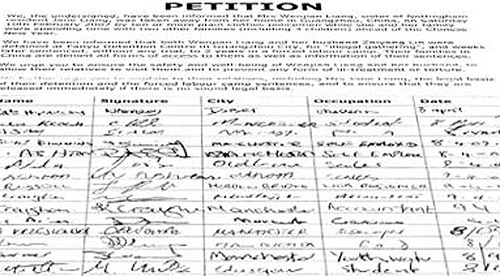
I sign a lot of petitions! Always on issues I care about and usually on questions that feel urgent. But does it matter? Do petitions have an impact?
Petitions to Elected Representatives
A lot of organizations I support convince me to sign their petitions because they send them directly to my representatives in Washington or my state capital. Signing their petition offers me a direct channel to my representatives to express what’s important to me. But, besides the automated response to thank me for caring, how do lawmakers use these petitions?
I called the office of my House Representative to find out. A staffer for MD Representative Dutch Ruppersberger confirmed that they treat petition data in the same manner that they do for individual phone calls, texts, emails and letters received from constituents. They enter all correspondence into an analytic software system called Intranet Quorum (IQ CRM) which allows staff to categorize the input by issue, bill or vote connected to it and constituent voter.
Also, the staffer I spoke with emphasized that petitions help advocacy groups and non-governmental organizations (NGOs) get noticed by lawmakers because these groups are mobilizing constituents even if the groups themselves don’t reside in their constituency. I asked whether it was important to sign a petition or make a phone call to our representatives when we know that they already support our views and the staffer confirmed yes; “It is always useful to know the level of public support for a vote”. She further explained that when a constituent identifies themselves through a petition their office can use that contact information to reach out directly to the constituent about votes on other issues the voter would care about.
Petitions to the White House
The White House website We The People was launched during the Barack Obama administration and continues to function under the Donald Trump administration. On We The People citizens can start their own petitions to the government on issues of their choice:
The right to petition your government is guaranteed by the First Amendment of the United States Constitution. We the People is a platform that empowers the American public to take this action like never before – it’s a way for anybody, anywhere, to speak directly to the government and become an agent for change. With We the People, you can easily create a petition online, share it and collect signatures. If you gather 100,000 signature in 30 days, we’ll review your petition, make sure it gets in front of the appropriate policy experts, and issue an official response.
Since its launch in September 2011 through December 31 2016 We the People gathered approximately 480,000 petitions, 29 million users and 40 million signatures. One petition launched on this site actually spurred the creation of a law! In January of 2013, internet activist Sina Khanifar started a We the People petition asking the government to make cell phone unlocking legal. Over the next 30 days, 114,000 people from across the country signed the petition, crossing the signature threshold needed for an official response. The Obama administration took this petition and the public enthusiasm behind it and pursued the idea through research and proposal recommendations which helped motivate Congress to take action. Sen. Patrick Leahy, Chairman of the Senate Judiciary Committee partnered with the Chairman of the House Judiciary Committee and they introduced joint legislation to restore the DMCA exemption. That legislation passed both Chambers unanimously in the form of the Unlocking Consumer Choice and Wireless Competition Act.
In reality, petitions sent to the White House may be the least effective (one out of 480,000 turning into law isn’t exactly the greatest of odds!). One reason for that is that petition-data created on the White House website stays there (making that data more difficult for activists to use for their own campaigns) and there isn’t a guaranteed follow-up channel for petitions which don’t reach the 100,000 signature threshold. But, this data is available for current and future administrations, there is no use-by date for the White House, and it’s a valid gauge on public enthusiasm on issues.
The most important thing, I think, about this website is that citizens have a direct channel to galvanize support and communicate their concerns to the White House. We The People is an undeniable tool at our disposal to strengthen our democratic process.
Petitions from Non-Government-Organizations and Advocacy Groups
Petitions are useful for non-profits organizations and advocacy groups in several ways:
- Signatures from citizens give organizations credibility with governmental institutions and elected lawmakers, as well as potential financial donors; their petitions show that public opinion is behind them in their advocacy;
- Contact information you share when signing a petition gives organizations and advocacy groups a valuable mailing list for future fundraising and advocacy campaigns;
- Petitions may be the first contact organizations have with concerned citizens so the petition introduces the public to their work and the potential for their participation, through volunteering or financial contributions.
- Signatures help organizations and advocacy groups gauge for themselves how important an issue is and the level of public awareness there is on an issue, which helps the organization determine their own strategies for action.
Create Your Own Petition?
Anyone, in any place in the world, can create their own public petition on www.Change.org, and some of these examples of success are really inspiring!
Risks of Signing that Petition
There is a risk that an organization will sell your contact information after you’ve signed their petition. Usually you can find a pledge not to sell data on reputable non-profit organization websites. Political organizations and campaigns also pledge not to sell your information. Spam filters usually filter out the worst spammers but there is always a risk that your email address or mailing address will be sold. Obviously, never put sensitive or private information on a public survey. Personally, If I don’t know and trust the organization I don’t sign on-line petitions which require my mailing address or phone number – I will give my email address, first and last name and zip code only.
Connecting the Dots between Petitions and Action

The above image is of a woman’s suffrage petition. I imagine that my great grandmother would have signed one of those petitions, though I don’t know how many times she actually cast a ballot, she died 5 years after American women won the right to vote. My grandmother for her part never missed an election and was an active volunteer to register voters and encourage people to exercise their right and duty to vote.
When we sign a petition, march for a cause we believe in, walk into the ballot box, we are not only exercising our rights as citizens, we’re honoring the people who have sacrificed and fought for these rights.
Whether petitions work to bring legislative change or just raise awareness on an issue, signing them does make a difference. But, to strengthen the chances of a petition bringing real change we need to follow up in any way we can;
- Write or call our elected representatives about how they vote;
- Check on the status of petitions we sign to the White House on We The People;
- Support the organizations and advocacy groups who are fighting for what we think is important with cash donations and volunteer hours when we can.
“The biggest benefit from a petition is raised awareness, Jason Del Gandio, a professor of communications and social movements at Temple University n Philadelphia, said in an interview with the NYTimes. “No president is going to do an about-face on a major policy because of 20,000 signatures. But coupling that petition with other tactics like marches, rallies, phone calls, face-to-face lobbying, a well-organized media plan and community outreach creates an environment in which the goals of the signatories can become reality.” That sounds a lot like Saving the World Every Day to me!
